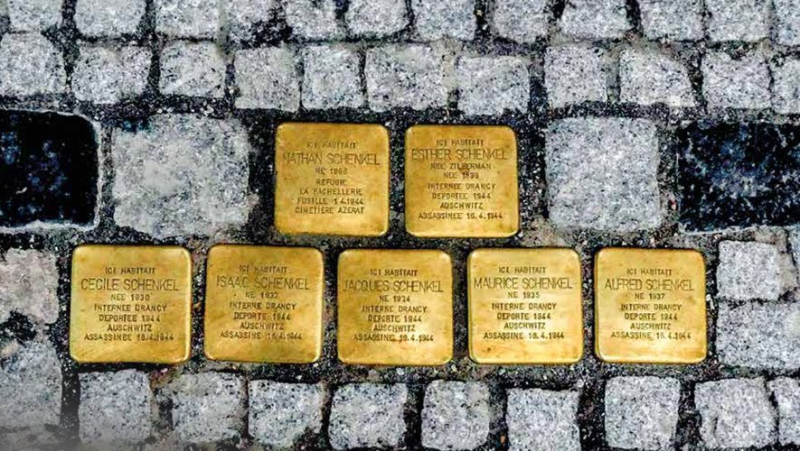Vendargues honors the memory of the victims of Nazism: we tell you all about the “Stolpersteine cobblestones”

Créations de l’artiste berlinois Gunter Demnig, ces pavés recouverts d’une plaque en laiton essaiment dans toute l'Europe depuis 1992. Creative Commons
On Sunday April 7, in line with a vast European artistic and civic project, three "Stolpersteine" will be sealed in Vendarguois soil to remember Augustin Bulingès, Henri Gaillard and Pierre Cayrel. A first in Occitania.
"This is a regional first", underlines Guy Lauret, the mayor of Vendargues. And certainly a unique way, in this year of the 80th anniversary of the Liberation, to revive the memory of three Vendarguois victims of Nazism.
This Sunday, April 7, three Stolpersteine paving stones, in line with this vast European artistic and civic project, will be sealed in the ground of the town.
From Chemin de Bannières to Place de la Mairie
At 10:30 a.m., the family of Augustin Bulingès will be there, at 22, chemin de Bannières (meet at the Armingué parking lot), for the installation of the first Stolpersteine in memory of their ancestor, born in 1915, prisoner of war interned in Rawa Ruska (Ukraine) and died on February 13, 1945 in Dresden (Germany).
Then the procession of personalities will follow the flag bearers to reach the town hall square and witness the sealing of the other two paving stones. One in memory of Pierre Cayrel, born in 1922, interned and mistreated in Schweinfurt (Germany), repatriated sick and died as a result of his captivity on May 18, 1946. And the other in the name of Henri Gaillard, born in 1922, arrested on March 7, 1944, interned in Compiègne, deported to Buchenwald, before being assassinated at the Flossenbürg concentration camp on January 19, 1945.
"Don't stop remembering"
"The sacrifice of these little or unknown people in Vendargues allowed the freedom that we enjoy every day, underlines Guy Lauret . As Marshal Foch said, people stop living when they stop remembering. I notice certain behaviors in today's society which are unfortunately similar to those of that era."
The mayor, alongside his predecessor Pierre Dudieuzère, the entire municipal council – including the deputy Laurent Vidal, grandson of Augustin Bulingès – and the municipal youth council will thus welcome the historian Christophe Woehrle, president of the Stolpersteine France association, but also François-Xavier Lauch, prefect of Hérault, or Michaël Delafosse, mayor of Montpellier and president of the Metropolis. Also announced are the senator of Hérault Hussein Bourgi and Perla Danan, president of the representative council of Jewish institutions in France.
"The commitment of all"
The disgruntled will ask the question of the event's budget. "The operation costs the price of the paving stones, continues Guy Lauret, or three times 132 €, to which are added the travel from Alsace of President Christophe Woehrle and the buffet. Plus the commitment of everyone, which is priceless because it is impossible to estimate its true value!"
The Stolpersteine, what are they ?
The Stolpersteine are a creation of the Berlin artist Gunter Demnig. These concrete or metal paving stones covered with a brass plaque honor the memory of a victim of Nazism, deported & eacute because she was Jewish, Roma, communist, member of the Resistance, homosexual, Jehovah's Witness, Christian in opposition to the Nazi regime or disabled.
The name of Stolpersteine (plural of the German word meaning "stumbling stones", i.e. " ;stones on which one stumbles") was é chosen by the artist to "encourage passers-by & stumble with their conscience and their heart on the tiles of memory.
Since the end of 1992, several thousand Stolpersteine have been destroyed. asked, initially in Germany but now in the majority of cases. of European countries which have joined the &agrav; this international civic project.
In France, the first Stolpersteine were installed in 2013 in Vendée, then in Charente-Maritime and Gironde. This Sunday, April 7, Vendargues will be the first town in Occitanie to welcome them.
I subscribe to read more




